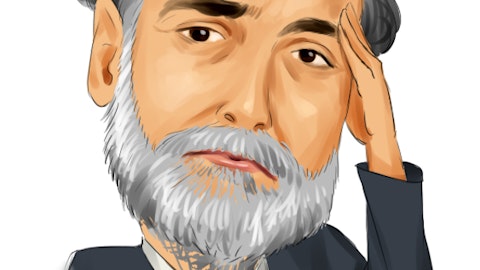At a time when many investors are seeking yield, much solace has been found in utilities, but one issue with this sector is its limited upside. Growth for these companies is generally low and investors rely on the stable dividend for return. We have identified five companies who pay a high dividend yield – greater than 3% – and have tremendous long-term growth potential, i.e. with a 5-year expected growth rate of 15% or more. These stocks are double whammies, offering relatively high income when treasuries are at historical lows, and the potential for serious price appreciation. We also believe these stocks can afford to continue to pay their dividends for the foreseeable future, as their payout ratios are below 100%.
The first stock on our list is Enterprise Product Partners L.P. (NYSE:EPD). Enterprise has a payout ratio of 92%, the highest of our five stocks, and a 16% expected growth rate. Enterprise has had consistent earnings beats over the past four quarters, beating by 10% in 2Q and 26% in 1Q. Analysts expect earnings to grow by 6% next year. Enterprise trades at a trailing P/E of 20 and a forward P/E of 21. With a yield of 4.7%, the company pays a dividend that puts it at an advantage to its peers. Enbridge Inc. and Kinder Morgan pay 2.9% and 3.9% dividend yields, respectively.
Although Enterprise’s payout ratio is 92%, the company retained $331 million in distributable cash from 2Q earnings. The company plans to spend close to $3.8 billion on organic growth using earnings and cash flow, and has no outside debt.
The next company is Siemens AG (NYSE:SI). Siemens is an integrated technology firm that pays a 3.8% dividend yield. The company’s dividend payout ratio is 42%, with an EPS growth rate at 23%. Siemens announced its second consecutive weak quarter when it released second quarter results. Next year EPS estimates only show a 0.6% growth, with revisions over the last 90-days dropping estimates for 2013 from $9.02 to $7.97. The company trades at a PEG ratio of 0.3, with its trailing P/E at 16 and forward P/E at 13.
Although the company has strong expected growth and is trading at enticing multiples, poor guidance from management and exposure to Europe has caused a few top named managers to dump the stock. Jim Simons dumped 38% of his 1Q stake, D.E. Shaw dumped 44%, and Ken Fisher dumped 63%.
Taiwan Semiconductor Mfg. Co. Ltd. (NYSE:TSM), as the name implies, manufactures and distributes integrated circuits and semiconductors. The company’s 2Q results showed a year over year revenue increase of 9%, with net income decreasing 2%. Sales have been beating estimates for four quarters. The company trades at a 16 trailing P/E and a 14 forward P/E. With the company’s expected 15% EPS growth rate, its stock trades at a PEG of 0.96. Taiwan Semiconductor’s dividend yield comes in at 9.4% and its payout ratio is 43%.
Jim Simons and Ken Fisher, who were dumping Siemens according to their 2Q 13F filings, were increasing their ownership of Taiwan, 40% and 29%, respectively. Also worth noting was the 316% increase in shares held by Arrowstreet Capital.
Rio Tinto PLC (NYSE:RIO) is a minerals mining and producing company that trades at a P/E of 23, which is above its largest peers due to its higher growth rate, an estimated 17%. Freeport McMoRan Copper & Gold trades at a P/E of 12 and Southern Copper at a P/E of 13. Rio’s forward P/E comes in at 6 and its PEG ratio is at 0.4. Rio currently pays out 75% of its earnings as dividends, with a dividend yield of 3.2%.
Ken Fisher owns the most shares of Rio of any firm we track, at 11.4 million shares. Howard Marks and Steven Cohen are a couple other top names owning Rio; see all bullish managers here.
British Sky Broadcasting Group PLC (LON:BSY) is a pay-television broadcasting and home communications company operating in the U.K. and Ireland. The company pays a dividend that yields 3.2%, which is a payout of 46% of earnings. 2Q EPS came in above estimates of $12.27, with actual EPS of $12.67, a 3.3% surprise. British Sky’s trailing P/E is 15 and its forward P/E 0.13. The company’s 15% expected EPS growth rate puts its PEG at 1.5.
While all of these companies have aggressive five-year growth estimates, we wanted to ensure that each could afford to continue its dividend while trying to fund growth. Thus, all of their payout ratios are below 75%, except for Enterprise. Enterprise has shown the ability to generate cash as of late, and also has the ability to raise equity if needed.






